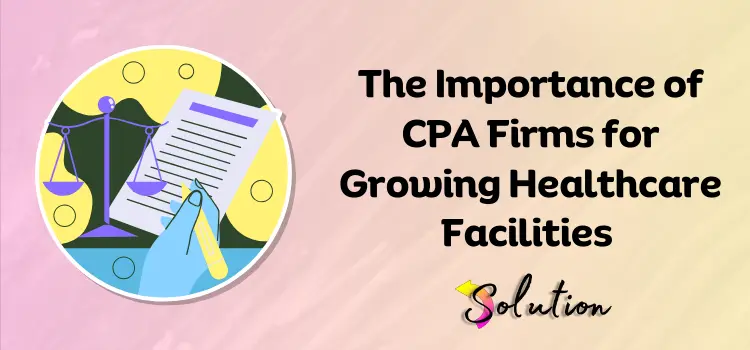
When it comes to clinics or hospitals, everyone considers clinical care facilities for patients, the top doctors, and medical equipment. However, one thing that is constantly overlooked is the accounting procedure of healthcare facility centres. Having a professional accountant with experience in healthcare accounting and tax procedures for clinics and hospitals is crucial.
In this guide, we will look at the importance of CPA firms in the healthcare industry. This guide will explore how CPA firms can help hospitals maintain high-quality service levels. As technology advances, you must understand how healthcare firms effectively manage their bookkeeping with CPA professionals to ensure smooth financial processing. Take a peek and expand your expertise in the finance area.
What Is the Role of a CPA in Healthcare Accounting?
In healthcare accounting, a Certified Public Accountant (CPA) is a financial management, reporting, and auditing specialist who works for healthcare organizations such as hospitals, clinics, private practices, or nursing homes. The job of a CPA in the healthcare business is very important; to help you understand its facilities in depth, there are some compiled pointers listed below; please have a look.
1. Financial Reporting and Compliance
Healthcare companies are subject to severe financial reporting rules, which assure transparency and accountability. CPAs will guarantee that the company’s financial statements appropriately reflect its financial condition. The primary responsibility of CPAs is to create financial statements that conform with generally accepted accounting principles (GAAP) and healthcare-specific criteria.
In order to prevent penalties for noncompliance, they must account for government reimbursements and report on their expenditures. It is important because inaccuracies in financial reporting can result in audits, fines, or loss of financing from government programs or investors.
2. Helps in Bridging the Gaps and Preparing the Budget
Healthcare organizations often deal with complex cost structures, ranging from medical employee pay to the costs of high-tech equipment and pharmaceuticals. CPAs help track and allocate expenses for numerous departments and services. For example, they can evaluate the true cost of a certain medical treatment by taking into account labor, equipment consumption, and overhead.
CPAs help healthcare businesses improve budgets and stay financially viable without sacrificing patient care by identifying inefficiencies and high-cost areas. CPAs can accomplish this by identifying and addressing the most costly inefficiencies, reducing human error, automating medical billing, and streamlining insurance reimbursements. With a full-service, high-quality outsourced accounting firm, you can identify the challenges affecting your bottom line and devise a strategy to address them.
3. Revenue Cycle Management
Management of money from patients, insurance companies, and government programs is critical for healthcare firms since delays or inefficiencies can harm cash flow. CPAs manage billing and collections, ensuring that insurance claims are correct and compliant. They also resolve refused claims, underpayments, and unpaid patient accounts.
Healthcare providers sometimes experience delays in collecting compensation owing to coding problems or complex insurance rules. CPAs simplify these processes to prevent revenue leakage and ensure consistent cash flow. Outsourcing accounting frees up resources, allowing you to focus on building a genuinely customer-centric organization.
4. Regulatory Compliance
Healthcare is among the most severely regulated businesses. Organizations must comply with regulations and standards such as HIPAA (patient data privacy) and SOX (Sarbanes-Oxley Act, which promotes financial openness). CPAs assist in the implementation and monitoring of internal controls to ensure regulatory compliance. They also assist with regulatory audits and document preparation to meet reporting requirements.
Noncompliance can result in significant fines, reputational damage, and legal challenges. CPAs serve as a safeguard to guarantee that the organization meets legal and ethical requirements. With an outsourced accounts receivable staff, you can focus on your core skills while reducing the inherent risk of regulatory compliance. This approach can enhance your business’s profitability and catapult it to unprecedented heights.
5. Proper Tax Planning and Strategies
Healthcare businesses, particularly private practices and for-profit entities, must manage complex tax laws in order to avoid obligations and maximize savings. CPAs identify industry-specific deductions, such as depreciation on medical equipment or charitable contributions to non-profit organizations. In order to avoid penalties, they help ensure that taxes are filed on time and accurately.
Effective tax planning enables healthcare providers to reinvest savings in improved equipment, manpower, or expanded services, thereby improving patient care. Tax preparation for healthcare firms facilitates timely completion and filing.
6. Audit and Risk Management
Auditing guarantees that a healthcare organization’s financial operations are transparent, accurate, and fraud-free. CPAs conduct internal and external audits to evaluate financial operations. They assess internal controls, uncover fraudulent actions, and suggest ways to reduce risks. By detecting risks, CPAs assist organizations in avoiding financial disasters and legal concerns.
CPAs may help you save money by assisting your medical institution in reducing costs that do not improve patient care, which is an important function of a healthcare account. Furthermore, using the best healthcare accounting software to automate procedures like invoicing can boost profitability even further. Audits safeguard the organization’s image and ensure the appropriate use of funds.
Top 5 Ways to Choose the Best Healthcare Accounting
Now that you understand the value of a healthcare accountant, you must also understand the importance of choosing the correct healthcare accountant for your healthcare firm. For your convenience, we have created a list of factors to consider before selecting a healthcare accountant.
1. Education
Consider that the qualifications of a healthcare accountant must go beyond a fundamental understanding of financial principles. The individual must have a certification, such as Certified Public Accountant (CMA), which is extremely valuable in healthcare accounting. Having a CPA certificate indicates that the individual understands financial accounting, auditing, and taxation, which are all important components of healthcare finance management.
Furthermore, a worker with CMA certification possesses sufficient skills in accounting management, decision support, and strategic planning. All of these abilities are necessary for making informed financial decisions in healthcare practices.
2. Understand Different Healthcare Softwares
Healthcare practices rely on industry-specific software, such as medical billing and practice management systems. An accountant who understands these types of technological solutions may readily collaborate with you on your financial processes, such as submissions and bookkeeping.
3. Having Experience in the Healthcare Industry
The applicant must also have expertise working with healthcare providers and accountants and have a thorough understanding of the industry’s specific issues and opportunities. Healthcare accounting methods work in a complex environment of laws, revenue cycles, and insurance billing. An accountant with hands-on expertise in healthcare accounting may provide knowledge of industry-specific difficulties, allowing them to solve financial challenges effectively and find chances for growth.
4. Have Compliance Expertise
Compliance with healthcare standards, such as the Health Insurance Portability and Accountability Act (HIPAA), is critical. This includes patient information protection as well as penalties for infractions, which can result in large fines and legal consequences. A healthcare accountant must comprehend these standards to guarantee that financial procedures and data management comply with HIPAA requirements, protecting patient privacy and practice integrity.
5. Have Communication Skills and Analytical Knowledge
Having good control over analytical methods is critical for managing accounts in the healthcare industry. This is necessary for communicating complex financial facts to non-financial stakeholders in a simple and effective manner. Furthermore, they can examine detailed financial reports, uncover cost-saving options, and assure regulatory compliance. With these talents, you can improve the overall financial health of a healthcare business.
6. Cost Effectiveness
Selecting a cost-effective healthcare accountant guarantees the provision of top-notch services without exceeding your budget. Evaluate their pricing structure and compare it to the value of the services provided. A smart accountant will find cost-cutting opportunities, enhance financial management, and increase profitability, so their services are an investment rather than an expense. Avoid low-cost alternatives that impair quality.
7. Reputation and References
An accountant’s reputation demonstrates dependability and professionalism. Check internet reviews, testimonials, and ratings to determine customer satisfaction. Seek recommendations from industry colleagues to establish credibility. A well-regarded accountant frequently has demonstrated knowledge in healthcare finance, providing you confidence in their ability to manage your organization’s specific financial requirements efficiently and ethically.
End note!
Healthcare firms face a dynamic environment that includes shifting laws, increased expenses, and unpredictable revenue streams. CPAs have the necessary experience to handle these obstacles, ensuring that healthcare organizations maintain financial stability while providing high-quality treatment. Despite issues with cash flow and compliance, you can increase your company’s success by working with efficient healthcare accounting firms. If you found this guide useful, check out our other blogs to expand your knowledge and lessen your workload with smart work!


